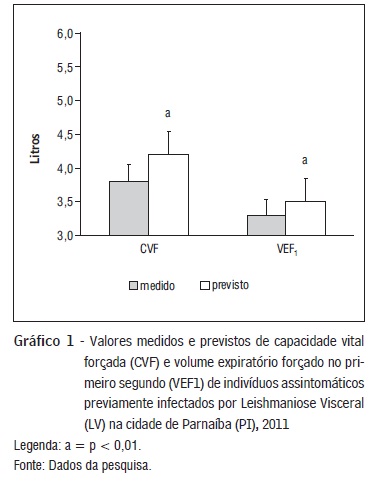INTRODUCTION: Although scarce, the main changes observed during cardiopulmonary infection with Visceral Leishmaniasis (VL) refer to histological and immunological and few reports of functional repercussions. OBJECTIVE: To verify and analyze the existence of chronic adaptations in pulmonary function in individuals who have been infected by VL. MATERIALS AND METHODS: It is a descriptive cross-sectional study, which evaluated nine people aged between 18 and 62 years. Anthropometric measurements and spirometry and manometer tests were performed according to the specifications of the American Thoracic Society / European Respiratory Society (ATS/ERS). For comparison of the measured and predicted values was performed Student t test for dependent data. The level of significance was p < 0.05. RESULTS: The Forced Vital Capacity (FVC) (3,8 ± 0,9 ± 0,8 vs. 4,2 l) and Forced expiratory volume in first second (FEV1) (3,3 ± 0,7 ± 0,7 vs. 3,5 l) were statistically smaller in measured values (p < 0.05). The FEV1/FVC ratio (87.6 vs. 84.4%) was higher in the measured values (p = 0.08). CONCLUSION: The data indicate that infection with VL seems to develop chronic adaptations on the respiratory system, resulting in decreased lung volumes and a tendency to restrictive breathing patterns.
Visceral Leishmaniasis; Respiratory system; Pulmonary function tests


